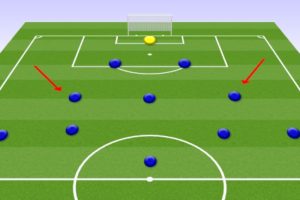How to Read the Game as a Centre-Back: Tips and Strategies for Effective Defending
As a centre-back, it is crucial to be able to read the game effectively. This means being able to anticipate opposition movements, react accordingly, and position oneself in the right spot at the right time to win the ball. Reading the game is not just about reacting to what is happening in front of you, but also about being aware of what is happening around you.
One of the most important skills for a centre-back is the ability to anticipate opposition movements. This means being able to read the body language of the opposition players, and predict where they are likely to move next. By doing this, a centre-back can position themselves in the right spot to intercept a pass or make a tackle, before the opposition player even has a chance to make their move.
Another key skill for a centre-back is the ability to maintain a strong defensive shape. This means being able to communicate effectively with other defenders, and ensuring that the defensive line remains organized and compact. By doing this, a centre-back can prevent the opposition from finding gaps in the defence, and make it difficult for them to create scoring opportunities.
Positioning
As a centre-back, positioning is crucial to reading the game effectively. It involves staying alert and aware of the opposition’s movements and anticipating their next move. Good positioning will help you maintain a solid defensive line and prevent the opposition from scoring.
Reading the opposition’s attack
Reading the opposition’s attack is an essential part of good positioning. It involves analyzing the opposition’s movements and predicting their next move. By doing so, you can position yourself in the best possible place to intercept the ball or block a shot.
| How to read the opposition’s attack: | What to look for: |
|---|---|
| Watch the ball carrier’s body language | Are they looking to pass or shoot? |
| Pay attention to the opposition’s formation | Where are the gaps in your defense? |
| Communicate with your teammates | What do they see? |
Anticipating the next move
Anticipating the opposition’s next move is another crucial aspect of good positioning. It involves predicting where the ball will go next and positioning yourself accordingly. By doing so, you can intercept the ball or block a shot before it reaches your goal.
- Pay attention to the opposition’s passing patterns
- Anticipate long balls over the top
- Watch for runs in behind your defense
Maintaining a good defensive line
Maintaining a good defensive line is essential to preventing the opposition from scoring. It involves positioning yourself in a way that allows you to cover your teammates and prevent the opposition from getting in behind your defense.
| How to maintain a good defensive line: | What to look for: |
|---|---|
| Stay level with your fellow defenders | Are you covering the same areas? |
| Communicate with your teammates | Are you all on the same page? |
| Stay aware of the opposition’s movements | Are they trying to break through your defense? |
Communication
As a centre-back, communication is a crucial aspect of your role. You need to be constantly communicating with your teammates to ensure that everyone is on the same page and that the defense is organized and working together effectively. In this section, I will discuss two key aspects of communication as a centre-back: talking to your teammates and organizing the defense.
Talking to Your Teammates
One of the most important aspects of communication as a centre-back is talking to your teammates. You need to be constantly communicating with your fellow defenders, as well as your midfielders and goalkeeper, to ensure that everyone is aware of what is happening on the pitch. This includes providing updates on the location of opposing players, calling for support when necessary, and directing your teammates on where to position themselves. To effectively communicate with your teammates, it is important to use clear and concise language. Avoid using overly technical terms or jargon that may not be understood by everyone on the team. Additionally, be sure to speak loudly and clearly, especially when playing in a noisy or crowded stadium.
Organizing the Defense
Another key aspect of communication as a centre-back is organizing the defense. You need to be constantly aware of the positioning of your fellow defenders and the opposing players, and be able to direct your teammates to ensure that the defense is properly aligned. To organize the defense effectively, it is important to use a combination of verbal and nonverbal communication. This may include using hand signals or gestures to indicate where your teammates should position themselves, as well as providing verbal instructions and support. In addition to communicating with your teammates, it is also important to be aware of the overall strategy and tactics of the team. This may involve communicating with the coach or other team members to ensure that everyone is on the same page and working towards a common goal. Overall, effective communication is essential for success as a centre-back. By talking to your teammates and organizing the defense, you can help ensure that the team is working together effectively and that everyone is aware of their role on the pitch.
Physicality
As a centre-back, physicality is an essential attribute to have. It allows me to win duels and maintain my position on the field. Winning aerial duels, tackling, and intercepting are all physical aspects of the game that I need to excel at to be successful in this position.
Winning Aerial Duels
Winning aerial duels is a crucial part of a centre-back’s role. It requires good timing, positioning, and jumping ability. To win an aerial duel, I need to be in the right position, time my jump correctly, and use my strength to outmuscle my opponent. It is also important to be aware of my surroundings and anticipate where the ball is going to land.
According to Sportskeeda, upper body strength is a huge advantage to any central defender, allowing me to physically out-muscle any competition on the ball. It is important to stand my ground and ensure I do not get pushed off the ball.
Tackling
Tackling is another physical aspect of the game that is crucial for a centre-back. It requires good timing, technique, and physical strength. A well-timed tackle can stop an attack and prevent the opposition from scoring.
According to Soccer Coach Theory, a centre-back must be able to tackle opponents and win the ball back. It is important to read the game well so that I can anticipate where opposition attackers will move next. This allows me to position myself correctly and make a well-timed tackle.
Intercepting
Intercepting is another physical aspect of the game that is important for a centre-back. It requires good anticipation, positioning, and speed. Intercepting a pass can stop an attack before it even begins.
According to Khel Now, the centre-back position is less about physicality and lunging towards attackers but more about anticipation, observation, and the ability to read the gameplay, filling the gaps, covering for full-backs/wingers, and intercepting through balls.
| Attributes | Importance |
|---|---|
| Timing | Crucial for a well-timed tackle or interception |
| Positioning | Allows me to be in the right place at the right time |
| Strength | Helps me win aerial duels and physical battles |
| Anticipation | Allows me to read the game and intercept passes |
Mental Preparation
Staying Focused for the Entire Game
As a centre-back, it’s important to stay focused for the entire game. This means not getting distracted by the crowd or the opposing team’s tactics. To stay focused, I like to take a few deep breaths before the game and remind myself of my role on the team. During the game, I focus on the ball and my positioning. I also communicate with my teammates to ensure we are all on the same page.
Another way to stay focused is to develop a pre-game routine. This routine should include stretching, warming up, and mentally preparing for the game. By having a routine, you can get into the right mindset and be ready to play your best.
Analyzing the Game During and After
During the game, I’m constantly analyzing the opposing team’s tactics and adjusting my positioning accordingly. I also pay attention to my teammates’ positioning and provide feedback when necessary. By analyzing the game in real-time, I can make quick decisions and help my team stay organized.
After the game, I like to review game footage to see where I can improve. This includes analyzing my positioning, decision-making, and communication. By reviewing game footage, I can identify areas where I need to improve and make adjustments for the next game.
| Key Points | Actions |
|---|---|
| Stay focused for the entire game | Develop a pre-game routine, focus on the ball and positioning, communicate with teammates |
| Analyze the game during and after | Adjust positioning, provide feedback to teammates, review game footage |
By staying mentally prepared, you can be an effective centre-back and help your team succeed. Remember to stay focused, analyze the game, and make adjustments when necessary.






